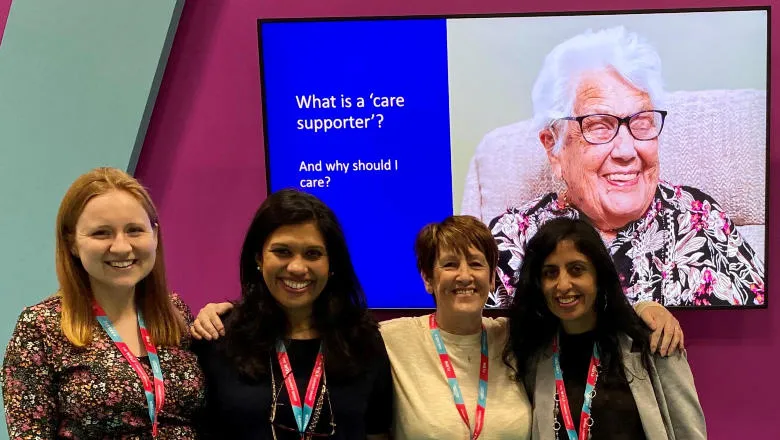06 November 2023
A trip to Birmingham for Care Show 2023
What is a ‘care supporter’, and why should I care?

What is a ‘care supporter’, and why should I care? This was the title question for a panel led by Dr Kritika Samsi and Jo Brown from the right to a care supporter study at Care Show Birmingham in October. The Care Show brings together professionals from across the social care sector in the UK for two days of talks, panel discussions and exhibitions. With over 4,000 delegates, it is one of the largest events in the care calendar.
The research team were joined by two members of the study’s advisory group – Diane Mayhew (Care Rights UK) and Palvi Dodhia (Serene Care Ltd). Diane opened the session by providing an overview of the campaign for a new legal right to a care supporter, which is being led by Care Rights UK in collaboration with John’s Campaign. Diane shared the origins of the campaign and some of the devastating stories from families separated from loved ones during the COVID-19 pandemic. She also spoke about the difference between a care supporter and visitor, focusing on the vital care, support and dignity that the former provides.
Kritika then invited Palvi Dodhia to share her experience as the Co-Founder and Director of Serene Card Ltd, a boutique care home operator that currently manages 3 homes. Palvi spoke about the multiple perspectives she brings to the role as both a manager and a family member with her own experiences of caring. These insights have shaped the values and ethos of Serene Care and the focus the company places on working with carers and families. Palvi and her team have appointed a Client Relationship Manager to work with residents’ loved ones to maintain good communication and a welcoming atmosphere.
To conclude the presentations, Jo Brown outlined the research questions for the care supporter study led by King’s College London. The team are particularly interested in finding out what might help or hinder the implementation of a potential new right to a care supporter. To do this, they will be interviewing health and care staff as well as people living with dementia and their families. Jo also outlined the team’s co-production work with two community stakeholder groups to design a 90-second animation and an A4 infographic. These resources will explain what a care supporter is, who might want to nominate one, and the importance of making your voice heard in health and social care.
The subsequent panel discussion explored some of the more practical elements of the potential new right to a care supporter. Early insights from phase 1 interviews with health and care staff indicate that staff would appreciate clarity on the difference between care supporters and existing roles such as next of kin and Lasting Power of Attorney. The panel spoke about the importance of communicating the value of the care supporter role and its relevance beyond the scope of COVID-19 lockdowns. At the end of the session, attendees were invited to find out more about the research by contacting the study team or registering for the free end of study conference due to take place on 9 February 2024.

